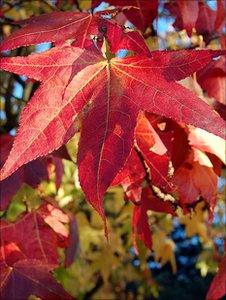Calls to green 'concrete jungle'
- Published

Trees in urban areas deliver a range of benefits, the report says
Trees can play an essential role in improving the quality of life in UK towns and cities, a report has said.
The Woodland Trust says planting more trees has been shown to improve air quality, reduce ambient temperatures and benefit people's health.
The trend of declining tree cover in many areas needs to be reversed in order to improve access to green spaces in urban areas, the study adds.
The trust is also launching a campaign to plant 20m native trees each year.
"Towns and cities tend to put into sharp relief some of the key problems we are facing as a society," said lead author Mike Townsend.
"So they are a good place to start when try to illustrate just where green spaces can deliver significant improvements for relatively little cost."
Taking cover
The issues outlined in the report included physical and mental health problems, childhood obesity, air pollution, soaring summer temperatures, flash flooding and diminishing wildlife.
The trust estimated that 80% of the UK population live in urban areas, yet less than 10% of people have access to local woodlands within 500m of their homes.
"If you look back over history, Victorian times saw a real move towards parks and street trees; some of the big street trees that you find in our cities today go back to these times," explained Woodland Trust conservation policy expert Sian Atkinson.
"What we have seen more recently is that there has been reduction in the number of trees being planted, and there has also been a loss of the lovely Victorian trees with big canopies," she told BBC News.
"We are starting to miss these from our towns and cities, and not enough thought has been given to replacements and to ensuring that there is going to be enough tree cover in the future."
'Slow the flow'
The report also highlighted the role urban trees could play in preventing flash floods.
Ms Atkinson said: "Hard surfaces in towns and cities have increased in recent years, and we are seeing more flooding.
"One of the problems is surface water drainage. It has been shown that trees and woods are key to help control this sort of flooding.
"As well as absorbing groundwater, tree canopies help reduce the volume of rainfall hitting the ground and relieve pressure on urban drainage systems.
She called on civic planners to address the issues highlighted by the report.
"This is quite a lot of talk about green infrastructure," she observed, "and our message is that we hope that trees and woods are a really big part of that."
In its Programme for Government report, the coalition government announced that it would initiate a national tree planting campaign.
During a speech in May, Environment Secretary Caroline Spelman said: "If any organism has demonstrated an ability to multi-task, it's trees.
"They capture carbon and hold soils together, prevent flooding and help control our climate. They also add immeasurably to the quality of life of our towns and cities."
She added that in some parts of inner London, it was calculated that each tree was deemed to be worth as much as £78,000 in terms of its benefits.
Ms Atkinson welcomed the government's announcement: "The UK has very low woodland cover compared with the rest of Europe. We are actually looking for a doubling in native woodland cover.
"There are some areas that have more cover than others, but - overall - there is quite a big job to do in order to increase tree cover to a level that provides all the benefits outlined in the report."
To coincide with the publication of the report, the Woodland Trust is also launching a More Trees More Good campaign, which will look to plant 20m native trees across the UK for the next 50 years.
- Published21 May 2010